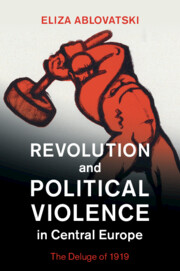'Ablovatski offers a bold comparison of the revolutions of 1919 in Munich and Budapest, situating both in the crisis of war, defeat and post-war longings for transformation of governance. Although both revolutions failed in 1919, contests over the meanings and memories of revolution shaped interwar political culture in both Hungary and Bavaria. Most significant in this study of revolution is Ablovatski's compelling explication of the counter-revolution that followed, one held together by anti-Semitic and nationalist ideology and manifested through new forms of political violence that would profoundly reshape the political landscape of Central Europe.'
Kathleen Canning - Rice University
'The revolutions that erupted in Budapest and Munich in 1919 cast a long shadow over the history of Central Europe. Drawing on compelling analysis of post-revolutionary trial records, Eliza Ablovatski offers a riveting and insightful account of the political myth-making that shaped transitional justice in both cases. A significant contribution to our understanding of this tumultuous period.'
Paul Hanebrink - Rutgers University
'In this splendid transnational history Eliza Ablovatski traces the ways that contemporaries used language to understand the disorienting experiences of revolution and counterrevolution in Budapest and Munich following the First World War. Yielding gripping narratives and surprising case studies, Ablovatski's analysis reveals that the violence experienced in 1919–1920 was not so much a psychological product of the brutalization of World War, but instead had deep roots in community anxieties common to pre-war Central Europe.'
Pieter M. Judson - European University Institute
‘The book can also be recommended to military historians in two other respects. First, it offers a detailed examination of the role of the Reichswehr and Horthy’s National Army in meting out extra-judicial punishments against real and imagined revolutionaries, including women, as well as acts of retribution disguised within judicial and (emergency) legal frameworks (courts-martial, preventive detention and so on). Second, Ablovatski poses the question as to who volunteered to fight in the Red Guards.’
Matthew Stibbe
Source: International Journal of Military History and Historiography
‘Enlisting a wide array of sources - including the press, novels, trial records, and memoirs - in the service of an elegantly written analysis, Revolution and Political Violence positions the short-lived soviet republics in Hungary and Bavaria within the wider post-1918 narrative of world revolution … the book demonstrates the value gendered approaches lend to our understanding of this tumultuous era and opens up new avenues of inquiry to scholars of the long World War I era in central and eastern Europe.’
Emily R. Gioielli
Source: American History Yearbook
‘… an excellent addition to the scholarly literature on contemporary Russian politics.’
Julian G. Waller
Source: Europe-Asia Studies



